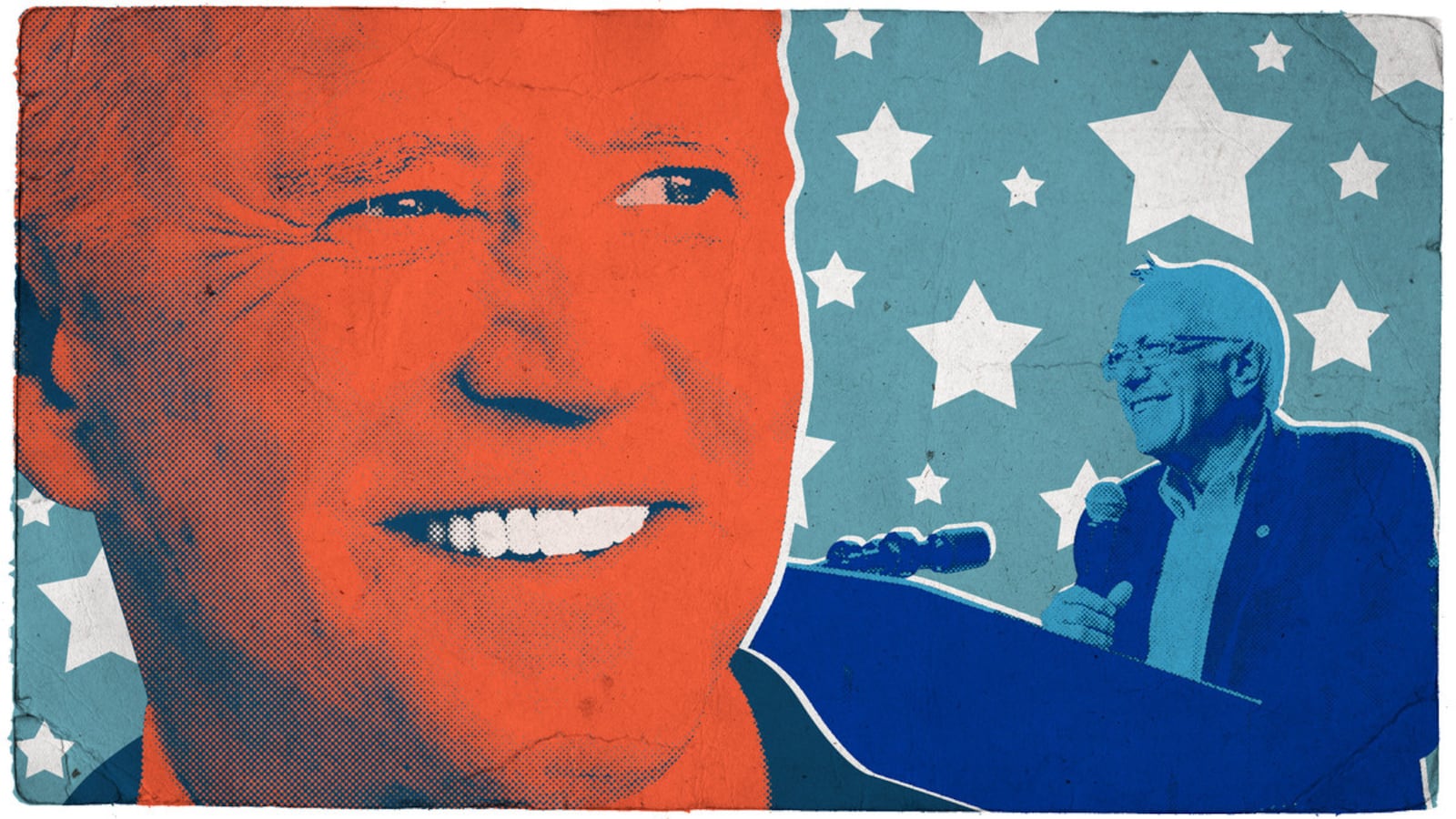It’s a common refrain in electoral politics that Democrats fall in love and Republicans fall in line. But that axiom appears to have been dispensed with on Tuesday night, when several states voted for the candidate they and their party leaders best felt could do the one task they’re desperate for come November: beat Donald Trump.
Former Vice President Joe Biden racked up a series of dramatic wins on Super Tuesday, starting with Virginia and sweeping through several other states, including Alabama, North Carolina, and Tennessee and delegate-rich Texas. He scored a surprise victory in Minnesota over Sen. Bernie Sanders (I-VT), who was expected to handily take away the state, and a win in Massachusetts, the home state of primary rival Sen. Elizabeth Warren (D-MA).
Sanders was also poised to make real inroads on the delegate count with a win in California—one that would undoubtedly keep him in competition for the nomination, if not in a good position to claim it. But Biden emerged from Super Tuesday noticeably jazzed by the results.
The few hundred people in attendance at his rally at the Baldwin Hills Recreation Center barely filled up a basketball court—as if his campaign hadn’t been anticipating the huge night it was having. But by the time Biden showed up, the venue was buzzing, as the former VP screamed with delight into his mic.
“They don’t call it Super Tuesday for nothing,” Biden declared. After appearing to momentarily confuse his wife and sister, he noted that the pundits were predicting his campaign might have been over by now. “Well, it might be over for the other guy!” he said, an apparent reference to Sanders. “We are very much alive!”
Indeed he was. A campaign that seemed on life support just one week ago suddenly found itself well positioned to lay claim to a delegate lead. And while the former VP certainly is beloved by a good chunk of the party, the people who helped him get there said the turnaround was driven by a pervasive, almost panicky, fear over Trump.
“I think that is correct,” Rep. Jim Clyburn (D-SC) told The Daily Beast in an interview on Tuesday night, when asked about the traditional dynamic flipping. “As I talk to people, they were feeling a lot of love for Joe Biden, but they were holding back because their head was saying he could not win. When people got the impression that he could win, then they went to the polls.”
Rep. Marcia Fudge (D-OH), the former chair of the Congressional Black Caucus who recently endorsed Biden, shared that opinion. “Totally agree,” she said. “He is genuine and people trust him.”
While Biden may have benefited from the perception that he could beat Trump, he also appeared to be constructing the type of voter base that had propelled Democrats to victory in the past. Turnout was up dramatically in suburban counties, where voters helped Democrats retake the House in 2018. And Clyburn pointed to Biden’s wins throughout Tuesday night as indicative of his ability to energize African-American voters, the most reliable constituency in the Democratic Party.
The first sign that Biden was going to have a Lazarus-like resurrection came in South Carolina on Saturday where, aided by Clyburn’s endorsement, he scored a massive primary win. Biden spent that election evening in Virginia, however. And by the time he got to Booker T. Washington high school in Norfolk for a rally on Saturday night, he was clearly feeling good. It was clear not only because he was surrounded by some of his closest pals—including the state’s popular former governor Terry McAuliffe—but he was walking out to an audience that seemed entirely unfazed by his lateness.
The crowd roared in bursts for nearly two hours before the former vice president took the stage. Sure, Beyoncé was booming loudly through the gymnasium’s sound system, but it was mostly for Biden.
By Tuesday night, those good feelings had exploded as results came in: Biden won the commonwealth. And then he won another state. And another state after that. Suddenly, he had laid claim to the South. And then Warren’s backyard. And then to the home turf of Sen. Amy Klobuchar (D-MN), who had dropped out of the race the day before to endorse him along with former South Bend Mayor Pete Buttigieg and former Rep. Beto O’Rourke (D-TX).
“The Dems listened to their leaders,” said Kyle Kondik, an elections analyst based in Virginia, discussing how voters cast their ballots in a strategic fashion for Biden.
Obstacles still remain for Biden, not least the fact that Sanders has the money, message, and mission to compete for the nomination, perhaps through the convention. But Tuesday night seemed likely to deliver crippling blows to the other candidates in the field.
Having faced the prospect of a second place finish to Sanders in Massachusetts, Warren ended up in third place instead. Biden’s first place victory came as a shock even to longtime Democrats in the state, who saw the race as a two-way contest between the New England senators. Just before polls closed in several states, Warren’s campaign released a memo outlining her upcoming travel. Over the next several days, she is expected to appear in Lansing, Michigan, Phoenix, Arizona, and Boise, Idaho.
“She needs to put delegates on the board,” said longtime Massachusetts strategist Mary Anne Marsh. But that prospect is much harder mathematically after Tuesday.
Michael Bloomberg may be in an even worse place. The former New York City mayor had focused the majority of his campaign strategy and resources on a strong Tuesday showing. But the day proved to be a disastrous comedown for a candidate who not long ago rode near the top of the polls in every big-delegate state of the night. Despite spending a king’s ransom on paid advertising and on-ground organization across the slate of 14 states—including $43 million on advertising in Virginia, North Carolina, and Alabama, compared to the $770,000 Biden spent in those states—Bloomberg seemed poised to claim victory only in tiny American Samoa, where he had seven staffers on the ground.
Even before then, he was bemoaning the state of the race while saying he had “no intention” of dropping out.
“Joe’s taking votes away from me,” Bloomberg said at his campaign’s Little Havana field office in Florida, when asked by a reporter about moderate Democrats dropping out in the last day to support Biden’s bid. “Have you asked Joe whether he’s going to drop out?” Bloomberg then challenged. “When you ask him that then you can call me.”
Speaking at his lavish “victory night” party in West Palm Beach, Bloomberg seemed positive.
“We’ve proven we can win the voters who decide the general election,” Bloomberg told an audience of supporters.
But the mood at Bloomberg headquarters in New York City, where the fun and ease of spending a king’s ransom to flood the airwaves with ads and Instagram with trolly #content had finally collided with the disappointment of real-world campaigning, was dour.
“This is not The West Wing,” one disenchanted staffer told The Daily Beast.
—With reporting by Matt Wilstein








